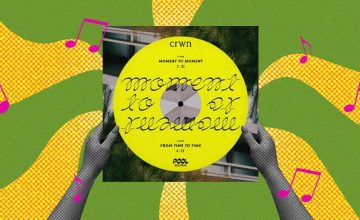Was there ever a point in your life when you were miserably struggling to express yourself that even your closest friends couldn’t get through to you? As much as you wanted to open up, you just couldn’t because even you didn’t know what you were feeling exactly. There were times when you would (pathetically) urge yourself to break down—just to assure yourself that you were still capable of feeling—but not even an insane amount of workload and sleepless nights could do the job. It felt like you had gone completely numb.
Because, same.
I was in my third year of college when I started to become detached from my emotions. Considering my age, I was already fully aware that the most ideal thing to do was to seek professional counseling, but I still chose to deal with it independently. Since I was taking film aesthetics and analysis at that time, I saw films (and other creative media) as possible tools to trigger these suppressed feelings. And that was when I decided to watch movies as a form of therapy and catharsis—hoping to overcome what seemed to be emotional constipation.
Slowly working your way out of an emotional rut, too? From themes on unlikely bonds to existentialism, here’s a list of heartwarming films that personally helped me. Take note, though, that my 20-year-old self found it extremely difficult to resonate with romantic films, so this curation doesn’t include anything that revolves around romance.
(Disclaimer: Yeah, I self-medicated—for lack of a better term—which is 100% not recommended. If you’re currently feeling the same way I did, or worse, your best option is to consult a pro.)
“The Shawshank Redemption” (1994)
by Dir. Frank Darabont
Adapted from the novel “Rita Hayworth and The Shawshank Redemption” by critically-acclaimed author Stephen King, this 1994 feature film explores the unlikely friendship between two prison inmates and how they help each other navigate the cruel realities of life behind bars. Rather than romanticizing prisoners, “The Shawshank Redemption” humanizes them by demonstrating their capacity for change and growth. It doesn’t shy away from showing what they face on the daily—including isolation, violence, and corruption.
Above everything else, though, it’s a story of atonement and hope. As one of its protagonists says, “Remember: Hope is a good thing, maybe the best of things, and no good thing ever dies.” (P.S. If you like the 2017 Korean drama “Prison Playbook,” this classic is a must-watch.)
“Sunday Beauty Queen” (2016)
by Dir. Baby Ruth Villarama
Empathy, admiration, and inspiration. My emotions play around these whenever I (re)watch “Sunday Beauty Queen.” It’s one of the best local films that came out in 2016—and I’m willing to die on that hill. This documentary follows a group of domestic helpers as they prepare for and participate in a beauty pageant held exclusively for overseas Filipino workers in Hong Kong.
Apart from addressing the personal struggles (working long hours for low pay) and sacrifices (loneliness from being far away from their loved ones) of these immigrant workers, “Sunday Beauty Queen” also highlights their urgent need for greater protection and support while raising awareness on economic inequality and labor exploitation.
In addition, the docu-film explores the pageant’s multiple purposes: a platform for self-expression, a tool for empowerment, a momentary escape from their immigrant lives, and a powerful symbol of resilience and creativity in the face of adversity.
“The Peanut Butter Falcon” (2019)
by Dir. Tyler Nilson and Michael Schwartz
While it may not necessarily make you cry, “The Peanut Butter Falcon” is a poignant and emotionally resonant film that will tug at your heartstrings. It revolves around a young man with Down syndrome and his quest to becoming a professional wrestler. He runs away from his nursing home and befriends a small-time outlaw (who eventually becomes his trainer and ally) along the way.
It’s a heartwarming tale of friendship and self-exploration that will leave you with warm and fuzzy feelings. Plus, it has been praised for its proper and realistic portrayal of characters with disabilities, making it a great antidote to films with problematic and/or inaccurate representations.
“Respeto” (2017)
by Dir. Treb Monteras II
Growing up, I’ve always had the impression that the indie film industry produces the most thought-provoking social commentary—and the 2017 local feature “Respeto” further reinforces this personal belief. It follows the story of an aspiring rapper who dreams of making it big in the local rap scene and his unexpected friendship with a retired poet who has a mysterious past.
The film explores the role of art in political activism while offering a gritty and honest portrayal of life in the slums of Manila. It confronts some ugly truths behind our justice system, raises questions about the value of respect, and sheds light on the challenges faced by marginalized communities. Its dynamic storytelling, multidimensional characterization, and symbolic use of visual and auditory elements all work together to create an emotional impact that lingers long after the film is over. (And in case you’re wondering, “Respeto” fills me with adrenaline and rage.)
“Dead Poets Society” (1989)
by Dir. Peter Weir
This powerful coming-of-age film is one of the few gems that I could watch over and over and would still be able to realize new things about it every time. Besides its impeccable cinematography, “Dead Poets Society” has a theme that remains relevant across generations: self-discovery, non-romantic human relationships, and the complicated in-betweens. It also celebrates the importance of literature and the arts as a means of self-expression and personal growth.
Challenging the idea that conformity is the best path to success, Robin Williams delivers a nuanced and exceptional portrayal of John Keating—an unconventional English teacher who encourages his students to pursue their genuine passion despite the status quo and the pressure of prep school. In essence, “Dead Poets Society” can stir a variety of emotions in every viewer—nostalgia, inspiration, grief brought about by loss, and reflection. It serves as a reminder to think critically and seize every given opportunity while embracing individuality.
Read more:
5 rom-coms that are for non rom-com people
These Asian queer romance series will make you go: ‘God, me when?’
In this A24 film, a childhood love shakes up the present
Still from “Respeto” (2017)
























Comments